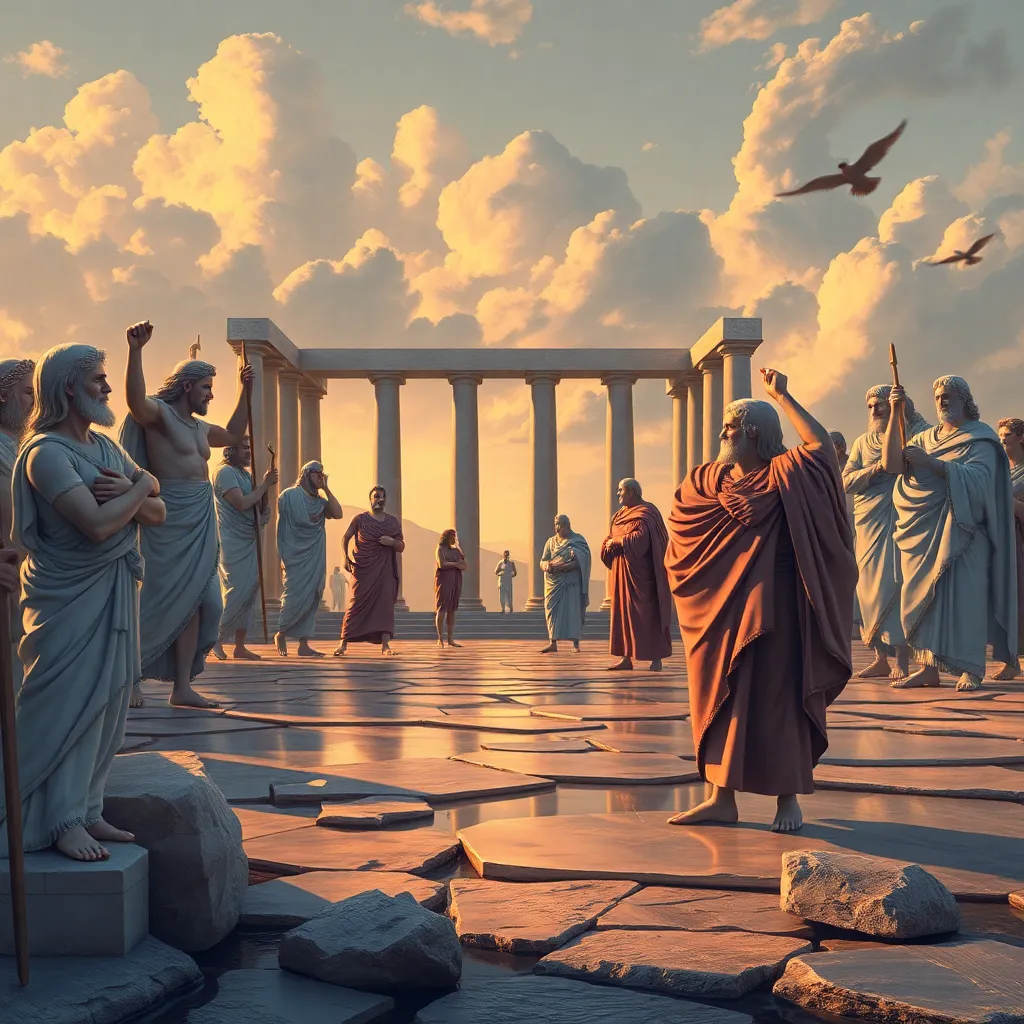The Iliad and Its Reflection on the Concept of Community
I. Introduction
The Iliad, attributed to the ancient Greek poet Homer, is a seminal work that captures the complexities of human experience during the Trojan War. This epic poem not only recounts the tales of heroic feats but also delves deeply into the social fabric of ancient Greek society.
Community was a cornerstone of life in ancient Greece, influencing individuals’ identities, relationships, and societal roles. The sense of belonging to a city-state or a collective group often defined personal honor and social expectations.
This article explores how The Iliad reflects and critiques the concept of community through its portrayal of heroism, honor, warfare, divine intervention, and the roles of women and marginalized voices.
II. The Heroic Code and Community Identity
The heroic code in The Iliad is a set of values that emphasizes personal bravery, honor, and loyalty to one’s comrades and community. It serves as a guiding principle for the characters, shaping their identities and their actions within the narrative.
Individual heroes, such as Achilles and Hector, play pivotal roles in shaping community identity. Their actions not only reflect their personal values but also influence the perception of their communities. For instance:
- Achilles: His rage and withdrawal from battle highlight the importance of personal honor over communal obligation.
- Hector: As the protector of Troy, his commitment to defending his city exemplifies the ideal of self-sacrifice for the greater good.
These examples illustrate how heroism can forge strong communal bonds, as the deeds of individuals resonate throughout their communities, inspiring collective pride and identity.
III. The Role of Honor and Shame in Community Dynamics
Honor and shame are critical concepts in Greek culture, deeply intertwined with community dynamics. Honor is earned through exemplary behavior and achievements, while shame serves as a powerful deterrent against actions that could dishonor oneself or one’s community.
These concepts significantly influence relationships within the community, as individuals strive to maintain their honor and avoid shame. The conflict between Achilles and Agamemnon serves as a poignant case study:
- Achilles feels personally dishonored by Agamemnon’s actions, leading to his withdrawal from the war, which ultimately harms the Greek collective.
- Agamemnon’s need to assert his authority and maintain his honor results in the loss of a vital warrior, showcasing the fragility of community cohesion.
This conflict highlights how personal dynamics rooted in honor and shame can disrupt communal harmony.
IV. The Function of Warfare in Community Cohesion
The Trojan War serves as a unifying event for the Greek city-states, bringing together diverse factions under a common cause. Warfare, while destructive, can also foster a sense of solidarity among individuals who share the burden of conflict.
The shared struggle against a common enemy creates bonds of camaraderie and collective identity. However, the paradox of war is evident:
- On one hand, it can strengthen community ties through shared experiences and mutual sacrifice.
- On the other hand, it leads to destruction, loss, and the potential for internal strife.
This duality reflects the complex nature of community, where unity and conflict coexist and shape the collective narrative.
V. The Influence of Divine Intervention on Community Relations
The gods in The Iliad are powerful influencers of human affairs, often intervening in the lives of mortals to shape outcomes. Their actions significantly affect community dynamics and alliances, revealing the interplay between divine will and human agency.
Divine favoritism can lead to favoritism among community members, resulting in:
- Unequal treatment of individuals, as seen with Achilles, who is favored by Thetis, his divine mother.
- Consequences for communities that depend on the whims of the gods, as illustrated by the shifting allegiances in the Trojan War.
These examples showcase how divine intervention complicates community relations and highlights the fragility of human alliances.
VI. The Role of Women and Marginal Voices in Community
While The Iliad predominantly focuses on male heroes, it also features significant female characters who contribute to the narrative in profound ways. Women in the epic, such as Helen and Andromache, provide critical perspectives on the impacts of war and community.
Additionally, marginalized voices, including those of captives and lesser-known figures, offer insights into the broader implications of community inclusivity:
- Helen: Her abduction sets off the war and illustrates how women’s roles can be pivotal in the formation and destruction of communities.
- Andromache: Her pleas to Hector emphasize the personal costs of war, reflecting the emotional toll on families and communities.
Their contributions challenge the traditional narratives and highlight the importance of considering all voices within a community.
VII. The Tragic Outcomes of Community Disintegration
Internal conflict within the Greek camp leads to significant tragic outcomes. The personal vendettas and disputes among the leaders create fractures in their collective strength, ultimately jeopardizing their mission.
The impact of these conflicts on communal survival is starkly illustrated throughout the epic:
- Achilles’ refusal to fight due to his conflict with Agamemnon weakens the Greek forces.
- The ensuing chaos and loss of life due to infighting highlight the consequences of community disintegration.
These reflections underscore the fragility of community, emphasizing that internal discord can be as destructive as external threats.
VIII. Conclusion
Throughout The Iliad, key themes regarding community emerge, including the significance of heroic identity, the dynamics of honor and shame, the role of warfare, divine influence, and the voices of women. These themes offer profound insights into the nature of community in ancient Greek society.
Moreover, the relevance of these themes persists in contemporary society, where concepts of belonging, identity, and conflict continue to resonate. The Iliad serves as a timeless reminder of the intricate balance between individual desires and communal responsibilities.
As we reflect on the enduring lessons of The Iliad, we recognize the importance of fostering inclusive and cohesive communities, capable of navigating the complexities of human relationships and shared struggles.




